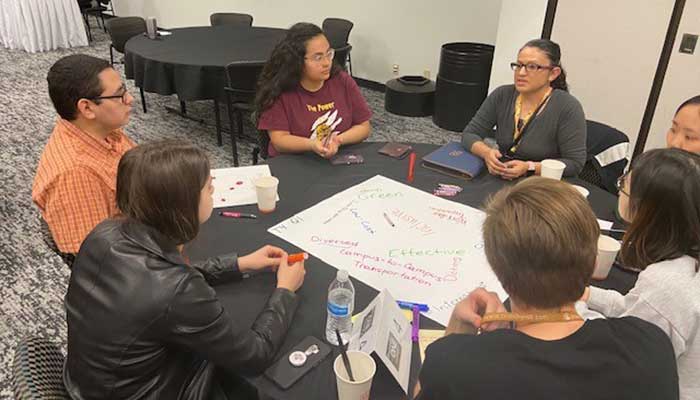Last updated on February 19, 2020
This article was written by Charles Roberts.
By now, you’ve heard that the Dallas County Community College District will become one college — Dallas College. Currently, each of the seven colleges within DCCCD operates independently, with separate accreditation. Transitioning to a single college under one accreditation will be a big challenge. But DCCCD is moving forward strategically with the help of student feedback.
How Did We Get Here?
Last year, the district found that our current structure was negatively impacting you, our students. Nearly 1,300 students were unable to receive degrees because they had not earned enough credits at one college. Those students had credits from several colleges that could not effectively be combined for a degree. Why? With the seven DCCCD colleges operating as separate institutions, current accreditation rules require a student to earn at least 25% of their credits from one institution.
Armed with this information, the board of trustees acted last August to begin the consolidation of our seven colleges into one college under a single accreditation. Going forward, students will graduate from one unified institution rather than accumulating credits at several schools that may not lead to a degree.
Since August, the district has been assessing what this change will mean for all stakeholders, including students. Central to how we implement our new structure is hearing from our students. In January, the district conducted a World Café session to give student leaders from all the colleges an opportunity to share their thoughts, opinions and concerns.
So, What Exactly Is a World Café?
World Café sessions are held in a playful and purposeful environment. They’re designed to encourage the sharing of ideas, help make connections and find out what’s working well and what needs changing.
Small groups engage in a structured conversational process intended to bring about open and intimate discussion. Then, ideas are linked within a larger group to tap into the collective intelligence and wisdom in the room.
How It Works
During the two-hour World Café session, 51 students were given a series of questions related to becoming one college that were intended to spark conversations. The questions were based on the following premise:
It’s Fall 2024. We have been one college since December 2020. You’ve opened the morning paper to find that an enterprising reporter from the Dallas Morning News has marked this milestone by conducting interviews with community and political leaders, major employers, small business owners, residents and students.
- How would you describe our college to people considering moving to Dallas?
- What is the greatest contribution our college makes to the region?
The session participants were then asked:
- What do you most want to read about us in the answers?
What Students Shared
As you can imagine, the session generated quite a few responses. The question, “What do you most want to read?” provided additional insight into what students value in an ideal college. Some of the top ranked responses to that question were:
- Offers food options — cafeteria, coffee shops, organic options
- Program for students to work and pay for classes (if they don’t qualify for financial aid)
- Scholarships
- Dorms/student housing
- 90% success rate/higher graduation rates
Based on their responses, students were asked to provide additional input with the following underlying questions in mind:
Considering who we want to become in five years, how are we getting in our own way? And what can we do to change that?
After student responses were gathered and categorized, a number of themes emerged:
How are we getting in our own way?
Advisors offer differing information Communication with students needs to be transparent, short and timely Inconsistency Red tape, too many regulations, large bureaucracy Resistant to change — archaic thinking, closed mindset Outdated technology Faculty may not use the latest technology
- Advisors provide differing information
- Communication with students needs to be transparent, short and timely
- Inconsistency Red tape, too many regulations, large bureaucracy
- Resistant to change — archaic thinking, closed mindset
- Outdated technology
- Faculty may not use the latest technology
What can we do to change that?
- Listen to all students — conduct more surveys and focus groups
- Be understanding, sympathetic, respectful, open-minded
- Develop a way for students to earn money if they don’t qualify for financial aid — internship, work study
- Better communication with students — streamlined, concise
- Better technology — updated, easily available, teachers know how to use
- More mental health resources on and off campus
- Evaluate advisors and add more
What’s Next?
For many students, the World Café session was their first opportunity to interact with other students from across the district. Participants were grateful to be able to share their thoughts and recommendations on such a meaningful topic. A number of innovative and actionable ideas, including suggestions for virtual classes and food options, came out of the session.
The process for becoming one college will continue long after the accreditation process this year. Answers to many of the questions students asked have not yet been determined. However, through additional feedback sessions like this, we hope to work with more students to help develop some of the answers.
